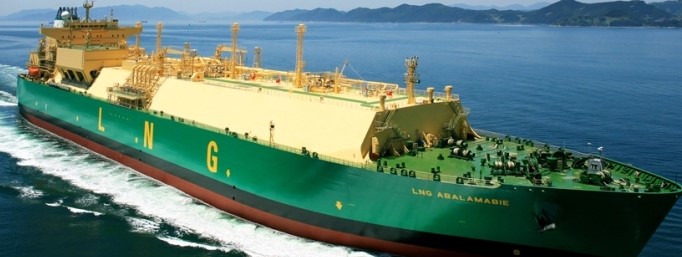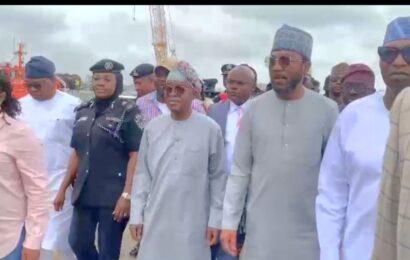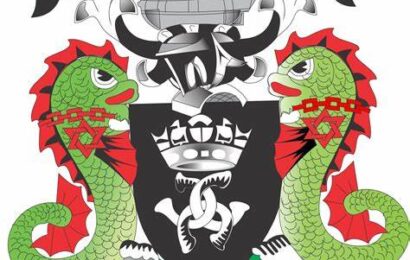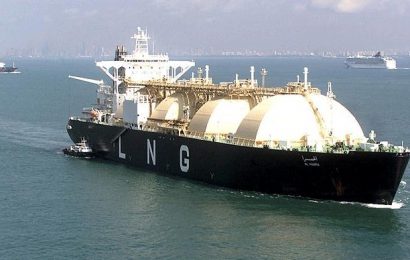
By citybusinessnews@yahoo.com —

On 25 June every year, seafarers are celebrated for keeping the global economy rolling despite various challenges.
With the global fight against the COVID-19 pandemic, the services seafarers provide according to experts are more important than ever.
Seafarers play an essential role in maintaining the flow of vital goods, such as food, fuels and medical supplies, that people, everywhere, need.
Indeed, today is an opportunity for stakeholders across the world including Nigeria to take stock and unveil fresh agenda where necessary.

For the Nigeria LNG, achieving its target of ensuring workforce including seafarers onboard its vessels are 100 percent Nigerians in line with the provisions of the Nigerian Content Act of 2010 is key.
Already, NLNG Ship Management Limited (NSML), a subsidiary of the NLNG, has achieved 83 percent of its Nigerianisation target.
Speaking at an interactive session with Journalists recently, Eyono Fatayi-Williams, General Manager, External Relations and Sustainable Development of NLNG, explained that as at December 2019, the company has in its employment list, 661 competent and professional employees.
Eyono Fatayi-Williams explained that number spreads across 297 officers, 329 ratings and 35 share-based personnel.
According to her, NLNG has two subsidiaries, Bonny Gas Transport Limited (BGT) and NSML, adding that NLNG has a total of 23 vessels in its fleet, 13 of which are owned by BGT, its subsidiary.
“NSML is the biggest employer of Nigerian seafarers on board its 13 NLNG directly-owned carrier ships. We have trained hundreds of seagoing officers, some to the level of captains and chief engineers,” Fatayi-Williams disclosed.
She added: “NSML, which initially was set up as a manning outfit in 2010, metamorphosed into an international maritime service company that is providing world-class services in vessel management, crew management, administration, terminal management and maritime training including projects and consultancy.”
Given insight, she stated that NLNG and its shareholders agreed on a Nigerianisation scheme in 1997, and the agreement was revisited and updated in 2004.
“The objective of the scheme which was to Nigeranise the company’s workforce was achieved in 2012. It started by recruiting Higher National Diploma graduates and training them as technicians and operators. This was a deliberate policy to enable the relatively young minds imbibe the skills, work culture, discipline and professionalism that the business requires,” he stated.
Meanwhile, information obtained by City Business News (www.citybusinessnews.com) indicates that NLNG Ship Management Limited (NSML) was incorporated as a private limited liability company on October 9, 2008, to provide a wide range of shipping services, including training, manning, fleet management and consultancy services to Nigeria LNG Limited (NLNG), Bonny Gas Transport (BGT) and the sub-Saharan Africa maritime sector.
It was initially set up as a manning outfit and commenced full operations in August 2010 as NLNG Ship Manning Limited in response to rapid changes and challenges in the maritime business and the scarcity of competent ship board personnel worldwide. In 2014, following the integration of NLNG’s Vessel Management activities, a repurposed NSML was launched in October 2014 known as “NLNG Ship Management Limited,” a full-fledge ship management company.In 2017,its scope of services expanded to include NLNG Maritime Centre of Excellence (MCOE)and Terminal Management services, upon the approval of the NLNG Shipping Re-organisation Strategy and the integration of both activities into NSML.
Over the years, NSML has grown from a purely manning company to an international maritime services company providing the following world-class maritime services:
Vessel Management
Crew Management and Administration
Terminal Management
Maritime Training, Projects and Consultancy.
Currently, NSML’s Fleet Management department manages eleven 11 LNG ships— seven Steam and four Dual Fuel Diesel Electric owned by Bonny Gas Transport (BGT)—ensuring the vessels are operated in line with flag state, class and the global maritime industry requirements. NSML ensures that these vessels are sea- and cargo-worthy at all times, thereby ensuring that NLNG achieves its aims of delivering cargoes safely and reliably to its customers globally.
NSML has also continued to implement the Nigerianisation Plan with regard to BGT vessels. Today, the company has achieved 82% of its Nigerianisation target and is on course to meet the 100% Nigerianisation target by 2022.
NSML’s Terminal Services department currently manages the NLNG’s Bonny terminal and provides efficient port operations ensuring the safe and timely shipment of export cargoes from the terminal.
NLNG Maritime Centre of Excellence (MCOE)
The MCOE is described as a one-stop maritime consulting and training outfit set up to provide marine and shipping technical services, maritime training, maritime project management and maritime consultancy for NSML, NLNG, and for the wider maritime industry. The MCOE is endowed with a maritime centre situated on Bonny Island.
The centre has the following national and international accreditations:
NIMASA accreditation as a Maritime Training Institute (MTI) and accreditation to conduct STCW courses.
Marshall Islands Flag Administration accreditation to conduct STCW and Seafarers’ training courses.
DNV-GL accredited Maritime Simulator Centre and Maritime Training Centre
ISO 9001:2015 by DNV-GL
Maritime Academy of Nigeria, Oron
NLNG said has supported the Maritime Academy of Nigeria, Oron, over the years, to train manpower for the industry. NLNG had engaged Warsash Maritime Academy, Southamptonto review the Nigerian academy’s STCW 95 courses. Warsash Maritime Academyfacilitated the accreditation process of Maritime Academy of Nigeria, Oron, to enable them issue MCA-approved certificates. The cost for these projects which includes purchase, installation and test-running equipment for the Academy was fully borne by Nigeria LNG limited.
NLNG said it also spent over US $100,000 on equipment, besides sponsorship of four lecturers and a Life Craft Technician to the United Kingdom for training. In 2010, NLNG made a donation worth N40 million to the academy to facilitate training of officers in Proficiency in Survival Craft and Rescue Boat (PSCRB).
Eyono Fatayi-Williams also disclosed recently that NLNG instituted a staff training and development drive for different cadres of technical staff to help them acquire the requisite skills and competence for management, supervisory and to hold operational positions in the company. “The company continues to recruit young engineers and other technical staff, as part of this initiative.
On the economic impact of NLNG’s operations on Nigeria, she pointed out that NLNG provided more than 2,000 jobs each construction year. “Overall, the major sub-contractors employed about 18,000 Nigerians in technical jobs in the Base Project.
“Through each Nigerian Content plan for its contracts, NLNG has promoted the development and employment of Nigerian manpower. For instance, 600 Nigerians were trained in Nigeria and at the contractors’ (Hyundai and Samsung) shipyards in Korea as part of the Nigerian Content deliverables tied to the construction of six new LNG vessels by BGT, a wholly owned subsidiary of NLNG,” she stated.
At the end, those 600 Nigerians, with enhanced skills in welding, hull assembly, pipe fitting, electrical, mechanical, painting and ship design joined the nation’s workforce, providing a support base for technology transfer and industrialisation.




